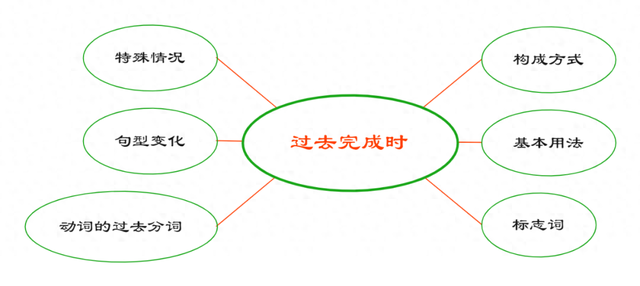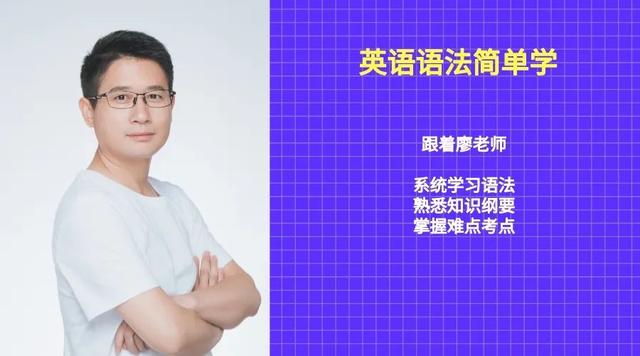【上期回顾】
【本期内容】
一、内容纲要


二、内容简述
(一)构成方式
该时态下,动词的形式是:had done。其中,had为助动词,done为动词的过去分词。had的否定表达为had not(hadn't)。
(二)基本用法
表达在过去某个时间或动作之前已经完成的动作或状态。它通常与一般过去时一起使用,以建立两个过去事件的时间顺序。常见的使用情况有:
1、时间顺序
当两个过去发生的事件相关联,且一个事件在另一个事件之前完成时,较早完成的事件用过去完成时表示。如:
【例句】She had finished her homework before her mother came home.
【分析】在这个例子中,“完成作业”是在“妈妈回家”之前完成的,所以使用过去完成时。
2、未实现的动作
表示在过去某个时间点之前已经计划或打算要做,但最终没有发生的动作,也就是原本想做某事,但最终没做成。如:
【例句】I had intended to visit the museum, but it was closed.
【分析】这里,“打算参观博物馆”是在“博物馆关门”之前计划的,但最终没有实现。
3、强调影响
用于强调一个过去事件对另一个过去事件的影响或结果。如:
【例句】He had studied hard, so he passed the exam.
【分析】这里,“努力学习”对“通过考试”这一结果有直接影响。
4、间接表达
有时用于间接表达过去某个时间点的状态或条件。如:
【例句】By the time the police arrived, the thief had already escaped.
【分析】这里,“警察到达”是在“小偷逃跑”之后,但句子强调的是小偷逃跑这一事实。
5、叙述故事
在叙述一个故事或事件的背景时,过去完成时可以用来描述在主要事件之前已经发生的事情。
【例句】She had lived in Paris for five years before she moved to London.
【分析】这里,“居住在巴黎”是在“搬到伦敦”之前的事情。
6、条件句
在某些条件句中,如果条件和结果都发生在过去,条件从句可能使用过去完成时,其实就是虚拟条件句的用法。
【例句】If he had followed my advice, he would not have failed the test.
【分析】这里的条件句和结果都发生在过去,所以条件从句使用过去完成时。
(三)标志词
常见的标志词有:
1、before+过去时间。如:
Before yesterday, they had not seen one another since November.
去年11月后,他们再未见过彼此,直到昨天。
2、by系列,表达“到...时候为止”,包括:by+过去时间点;by the end of+过去时间段;by the time+从句(表过去)。如:
By last Friday, the Dow had climbed nearly 10% from a 2012 low, hit in early June, and was within a hair of closing at its highest level since December 2007.
截至上周五,道指较2012年6月初创下的低点累计涨了近10%,已经非常接近2007年12月以来的最高收盘点位。
He had finished his work by the end of last month.
到上个月末为止,他已经完成了他的工作。
By the time he came back to domestic operations he had worked in every region of the world.
到他负责国内事务时,他已到全世界的任何一个地区工作过了。
3、before、after、when等连词连接表过去的复合句。如:
He had buried his wife some two years before he retired.
大概在他退休前两年,他妻子去世了。
She considered her duties done after she had married off all her daughters.
当把所有的女儿嫁出之后,她觉得自己尽到了责任。
She felt, oddly, that they had been happier when they had no money.
她感到奇怪的是,他们没钱时生活得更幸福。
(四)动词的过去分词
其规则变化与动词的过去式相同,都是在动词词尾加-ed。如:
1、直接+ed,如:worked, played。
2、以不发音的e结尾的,+d,如:lived, danced。
3、以“辅音字母+y”结尾的,改y为i,再+ed,如:cried, studied。
4、以重读闭音节结尾的,双写最后一个辅音字母,再+ed,如:stopped, patted。
其不规则的情况主要有以下五种,如:
1、AAA型,如:put-put-put, read-read-read。
2、AAB型,如:beat-beat-beaten。
3、ABA型,如:run-ran-run, come-came-come。
4、ABB型,如:shoot-shot-shot, make-made-made。
5、ABC型,如:swim-swam-swum, take-took-taken。
(五)句型变化
原句:We had already left Shanghai before she came back yesterday.
否定句:We had not left Shanghai before she came back yesterday.
一般疑问句及其回答:
- Had you already left Shanghai before she came back yesterday?
- Yes, we had.
- No, we hadn't.
划线部分提问:
When had you already left Shanghai?
(六)特殊情况
1、表“一...就...”的句型(表过去发生的事情)。如:
She quit school as soon as she had taken her GCSEs.
She had hardly/scarcely/rarely taken her GCSEs when she quit school.
She had no sooner taken her GCSEs than she quit school.
她一拿到普通中等教育证书后就没再上学了。
2、虚拟语气中,表对过去发生的事情的虚拟时。如:
He looked as if he had seen a ghost.
他那副样子好像见到鬼了。
If he had come yesterday, he could have seen the famous scientist.
如果他昨天来,他就能看到这位著名的科学家了。

